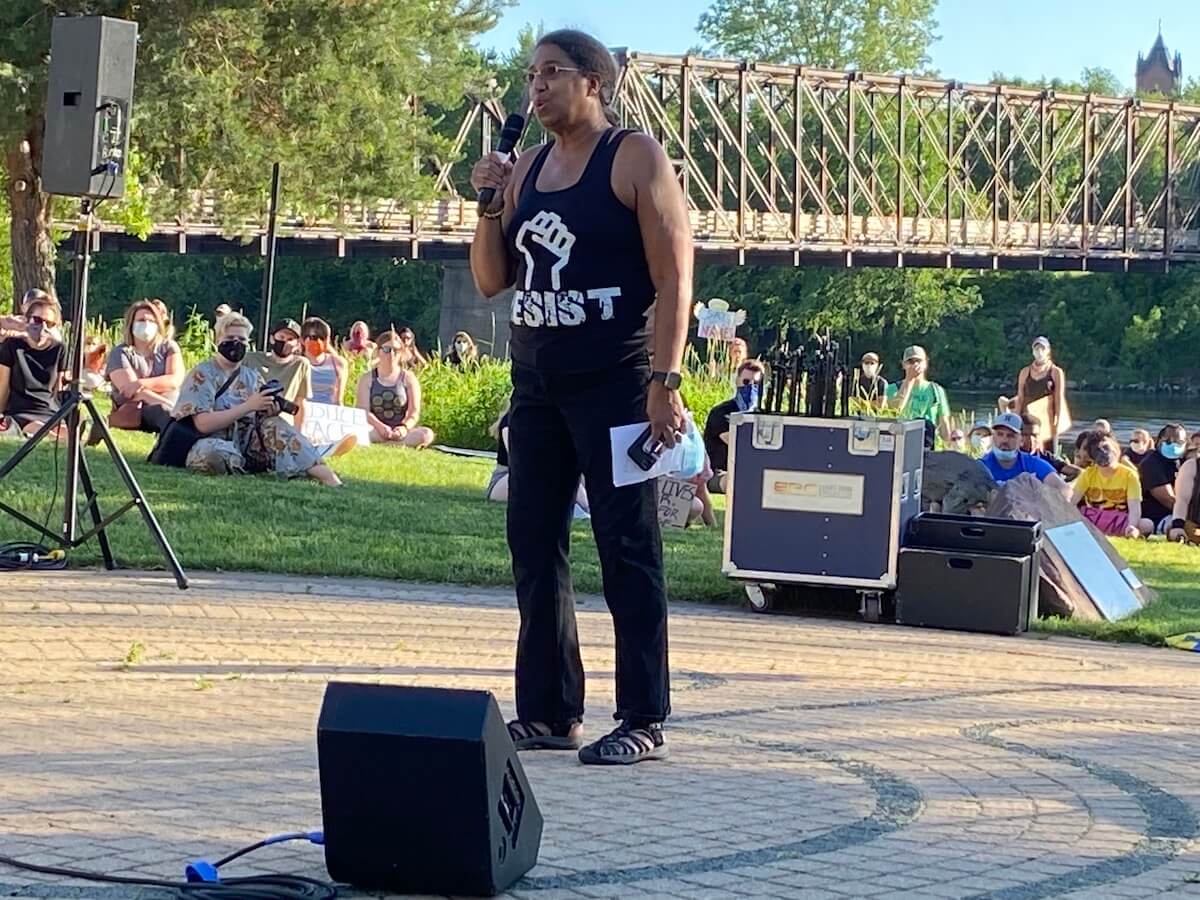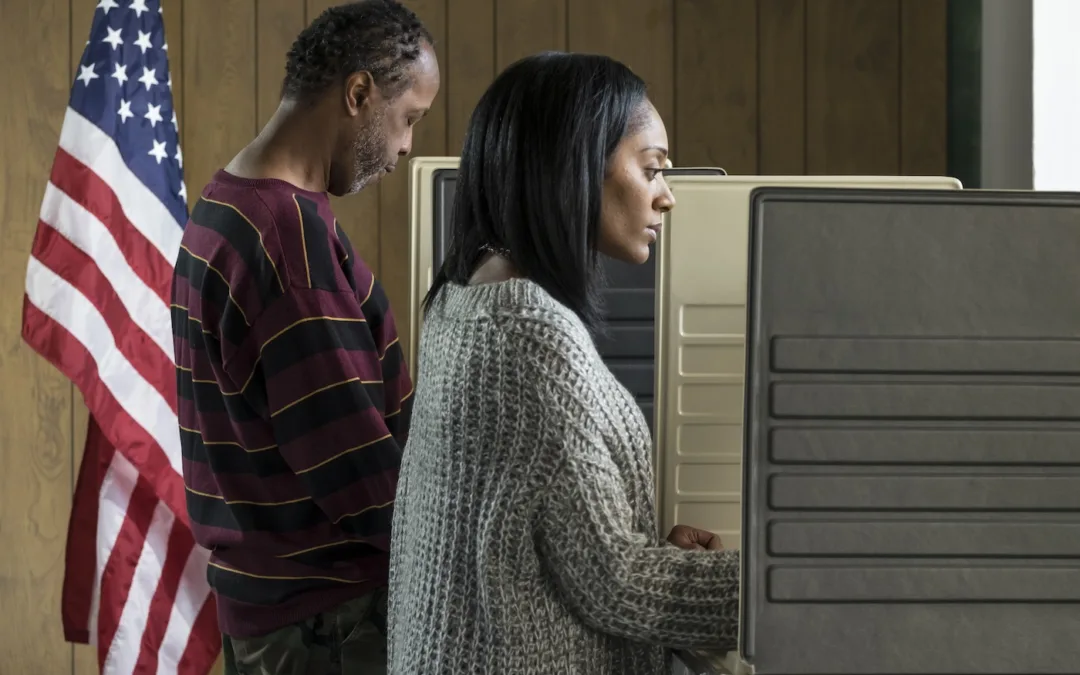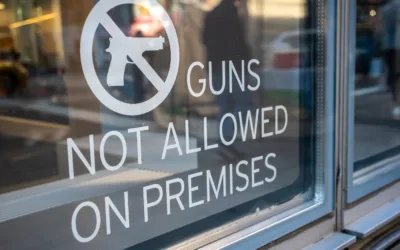
#image_title
Many see too many similarities between death of George Floyd and shooting of Jacob Blake.
When she first heard that Jacob Blake had been shot in the back multiple times by a Kenosha police officer, Milwaukee activist Cass Bowers was shocked that history seemed to be replaying a similar police act against a Black man three months ago in Minneapolis that garnered international attention.
On May 25 George Floyd died in Minneapolis after a police officer there knelt on his neck for nearly nine minutes, suffocating him. Floyd’s death caused an uproar, leading not only to the firing of four Minneapolis officers but worldwide protests, including many across Wisconsin.
So when Bowers first heard about police action against Blake — who was shot while he entered an SUV with several of his children inside — it was difficult for her to fathom.
“I was in utter disbelief that in this climate a police officer would shoot a Black man after seeing George Floyd murdered,” Bowers said Monday. “That (the officer) didn’t stop and think ‘wait, let me re-evaluate this situation. That is hard to believe.’”
But Bowers’ initial shock quickly transformed to another emotion: resignation. As a Black woman in Milwaukee, in her work for social justice-related causes, she has witnessed discrimination. She has felt the sting of racist actions and attitudes. Her son, too.
“In the same moment I felt disbelief, it was also like ‘we’re here again,’” Bowers said. “How many times have I seen this before? How many times have I posted on social media about these kinds of actions against Black people? I can’t even count the times.”
Others across Wisconsin had similar reactions to the shooting of Blake, who on Monday was listed in serious condition in a Milwaukee hospital. Many said their initial surprise and horror at learning of the incident transformed quickly into anger and sadness at the continued systemic racism in America that has resulted in the mistreatment and deaths of Blacks since they arrived in this country as slaves from Africa.
On Monday Gov. Tony Evers and Lieutenant Gov. Mandela Barnes held a news conference in response to the shooting in Kenosha during which they called on the Republican-controlled state Legislature to take up a series of police reform bills they proposed in June. On Sunday Evers’ office issued a statement about the incident.
“This didn’t start with George Floyd, and if we don’t do anything, it will continue” said Barnes, the state’s first Black lieutenant governor.
Not everyone agreed with their assessment of the shooting. Pete Deates, president of the Kenosha police union, called Evers’ statement about the situation “wholly irresponsible.”
“As always, the video currently circulating does not capture all the intricacies of a highly dynamic incident,” Deates said in a statement. “We ask that you withhold from passing judgment until all the facts are known and released.”
Selika Ducksworth-Lawton, a UW-Eau Claire professor of history and women’s, gender, and sexual studies, said she was saddened but not surprised by Blake being shot by police.
“This isn’t new,” she said. “It’s been happening to Blacks for a long time. And it just keeps happening.”
Despite the protests of Floyd’s death and a rising awareness of social justice concerns in America, police killings of Black people in this country haven’t stopped. Ducksworth-Lawton has posted many such incidents on her Facebook account since Floyd’s death.
Ducksworth-Lawton grew up in Louisiana, where her family encountered blatant racism. Just because she has become used to racist actions against Black people doesn’t mean it doesn’t hurt, she said.
“My community feels terrorized, fearful of police,” she said. “How long do these kinds of things need to keep happening before we get people to understand we need evidence-based policing? How long does it take before people get the fact that you can’t do this kind of thing anymore?”
The shooting of Blake is yet another sign that “we have a very serious racism problem in this state,” Milwaukee activist Jarrett English said. By most measures, Wisconsin ranks as among the worst state to raise a Black child.
“There’s a reason it’s called Wississippi,” English said in reference to Wisconsin as another version of Mississippi, where Black residents fare poorly in terms of economic outcomes, educational disparities, and other measures. “Our racism is not as direct as some of the racism of the past. It’s more indirect, insidious. But it’s definitely there.”
Savion Castro, a Madison school board member who is African American, said police shootings of Black people have become all too common, and police practices must change to prevent future deaths of that nature.
“Violence like this perpetuated against Black Americans has been routine in America,” he said.
‘This is America?’
As Wausau Mayor Katie Rosenberg marched in a Black Lives Matter protest in Wausau two months ago, she felt the mostly white city was making progress on improved race relations.
Among the nearly 2,000 people at the event were local police officers, a sign they were on-board with proposed training, policy changes, and other measures intended to curb racism in the community. Rosenberg spurred the creation of a seven-member task force designed to work with police to reduce race-related problems.
Then she learned about Blake’s shooting.
“I thought ‘Oh my God, this is America? This is Wisconsin?’” she said. “I asked myself, no matter what we do, is it enough?”
Bowers is asking the same question. Previous attempts at police reforms haven’t worked well enough, she said. To better address policing and other needs in the community, she advocates for redistributing some police funding to other programs, such as additional social workers, to respond more effectively to certain situations.
For example, she said, police lack training for many situations involving mental health issues, and that money currently given to police could be used more effectively by having social workers respond in many situations.
Calls for defunding police departments have grown across the country since Floyd’s killing, and a handful of communities, such as Minneapolis, have reduced police funding. However some in Wisconsin oppose such actions, saying they imperil the ability of police to provide basic protections.
Police in Eau Claire have been taking part in appropriate racial training, Ducksworth-Lawton said, and the City Council recently moved up funding to purchase body cameras for police. But many county sheriffs across the state have been resistant to such measures, she said, perpetuating mistreatment of Blacks and other people of color.
On the same day Blake was shot, Ducksworth-Lawton was a featured speaker at an outdoor showing of the movie “John Lewis: Good Trouble” in Eau Claire, a film about the social justice icon and longtime Georgia Congressman who died recently. That happenstance was appropriate, she said, given the action needed now to combat continued racism in America.
“It’s a scary world if you can be shot at random,” she said. “That is the world me and my family and Black people live in. And that is something we have to change if we’re going to get to a better place as a country.”

Multiple deaths in shooting at Abundant Life Christian School in Madison
The suspected shooter, a juvenile, is thought to be among those killed. At least six others have been wounded, as well. NOTE: This is an active...

FBI figures show 15% drop in violent crime in 2024
During the first quarter of 2024, there’s also been a 13% drop in aggravated assault, according to the FBI. Murder and rape both decreased by about...

Celebrate Wisconsinbly: A guide to the state’s weird alcohol laws
Did you know that the average Wisconsinite enjoys 634 drinks per year? That’s nearly 150, or an entire keg, more drinks than the national average....

Editorial: The next great story for Black History Month could be written in Wisconsin—on Election Day
Voters can choose to continue Biden’s investments in jobs, infrastructure, health care, and schools or return to Trump’s circus of chaos, where...




